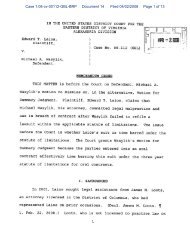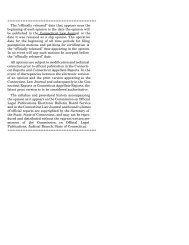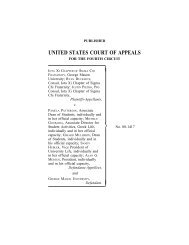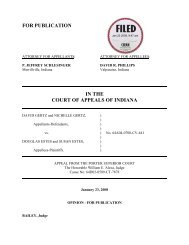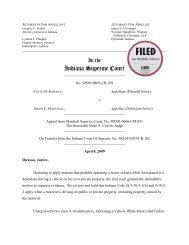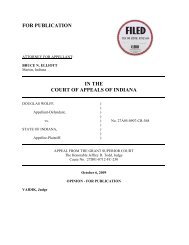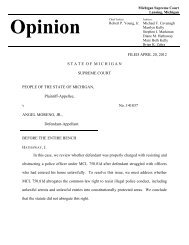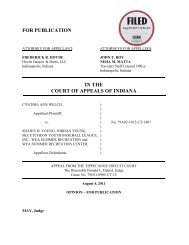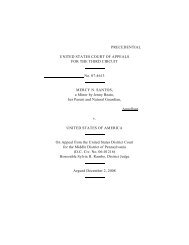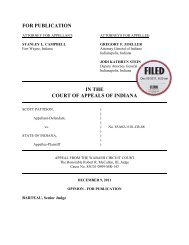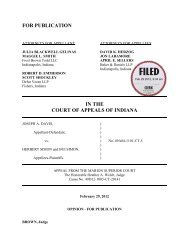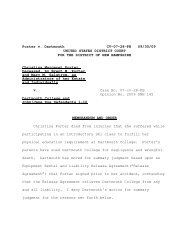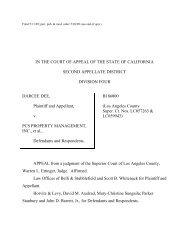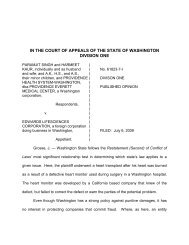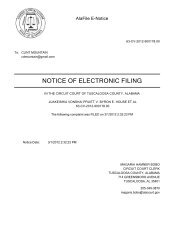not for publication without the approval of the - Lawyers USA Online
not for publication without the approval of the - Lawyers USA Online
not for publication without the approval of the - Lawyers USA Online
Create successful ePaper yourself
Turn your PDF publications into a flip-book with our unique Google optimized e-Paper software.
CECELIA MAVICA INGRAHAM,<br />
v.<br />
Plaintiff-Appellant,<br />
ORTHO-McNEIL PHARMACEUTICAL,<br />
JOHNSON & JOHNSON, and<br />
CARL DeSTEFANIS,<br />
NOT FOR PUBLICATION WITHOUT THE<br />
APPROVAL OF THE APPELLATE DIVISION<br />
Defendants-Respondents.<br />
_________________________________<br />
Argued June 2, 2011 - Decided<br />
SUPERIOR COURT OF NEW JERSEY<br />
APPELLATE DIVISION<br />
DOCKET NO. A-2216-10T2<br />
Be<strong>for</strong>e Judges Fuentes, Ashrafi and Newman.<br />
On appeal from Superior Court <strong>of</strong> New Jersey,<br />
Law Division, Middlesex County, Docket No.<br />
L-2926-08.<br />
Neil Mullin argued <strong>the</strong> cause <strong>for</strong> appellant<br />
(Smith Mullin, P.C., and Niedweske Barber,<br />
P.C., attorneys; Mr. Mullin and Kevin E.<br />
Barber, <strong>of</strong> counsel and on <strong>the</strong> brief).<br />
Francis X. Dee argued <strong>the</strong> cause <strong>for</strong><br />
respondents (McElroy, Deutsch, Mulvaney &<br />
Carpenter, LLP, attorneys; Mr. Dee, <strong>of</strong><br />
counsel and on <strong>the</strong> brief; David J. Reilly<br />
and David M. Alberts, on <strong>the</strong> brief).<br />
The opinion <strong>of</strong> <strong>the</strong> court was delivered by<br />
ASHRAFI, J.A.D.<br />
APPROVED FOR PUBLICATION<br />
August 25, 2011<br />
APPELLATE DIVISION<br />
August 25, 2011
Plaintiff Cecelia Mavica Ingraham appeals from a December<br />
3, 2010 order dismissing by summary judgment her complaint<br />
alleging intentional infliction <strong>of</strong> emotional distress. We<br />
affirm.<br />
Viewing <strong>the</strong> evidence most favorably to plaintiff, see R.<br />
4:46-2(c); Brill v. Guardian Life Ins. Co. <strong>of</strong> Am., 142 N.J. 520,<br />
540 (1995), <strong>the</strong> deposition <strong>of</strong> plaintiff and unrefuted evidence<br />
in <strong>the</strong> summary judgment record show <strong>the</strong> following relevant<br />
facts.<br />
Plaintiff was employed from 1994 to 2006 by defendant<br />
Ortho-McNeil Pharmaceutical. In 2006, she was working as an<br />
administrative assistant in a marketing department at<br />
defendant's Raritan facility. Plaintiff's immediate supervisors<br />
reported to defendant Carl DeStefanis, <strong>the</strong> director <strong>of</strong> <strong>the</strong><br />
department. Plaintiff had infrequent contact with DeStefanis,<br />
"usually a simple 'Hello, how are you' type <strong>of</strong> interaction."<br />
In 2003, plaintiff's only child, Tatiana, <strong>the</strong>n in her third<br />
year <strong>of</strong> high school, was diagnosed with acute lymphocytic<br />
leukemia. Tatiana was an excellent student with bright<br />
prospects. She was a member <strong>of</strong> <strong>the</strong> National Honor Society,<br />
National Latin Society, and National Art Society. She was<br />
accepted to Cornell University and planned to study biology as a<br />
pre-med student. She had also studied at <strong>the</strong> New Jersey School<br />
2<br />
A-2216-10T2
<strong>of</strong> Ballet, but was unable to continue dancing when her illness<br />
occurred. After several months in remission, Tatiana relapsed<br />
in April 2005. She developed an incurable infection and, sadly,<br />
passed away in May 2005. Her high school graduated her<br />
posthumously with top honors.<br />
Plaintiff's mourning was deep and enduring. To honor <strong>the</strong><br />
memory <strong>of</strong> her daughter, plaintiff kept pictures <strong>of</strong> Tatiana and<br />
her ballet slippers displayed in her cubicle at work.<br />
About one-and-a-half years after Tatiana's death, a human<br />
resources manager at Ortho-McNeill, Carmen Harris, met with<br />
DeStefanis to convey complaints she had received about<br />
plaintiff's conduct and interaction with co-workers. Several <strong>of</strong><br />
those complaints were unrelated to Tatiana, but administrative<br />
staff in <strong>the</strong> department had also remarked about plaintiff's<br />
tendency to speak to <strong>the</strong>m about Tatiana's tragic passing. The<br />
co-workers said <strong>the</strong>y sympathized with plaintiff, but <strong>the</strong>y felt<br />
uncom<strong>for</strong>table and at a loss <strong>for</strong> "what else that we can say that<br />
we have <strong>not</strong> said already." The co-workers said <strong>the</strong>y tended to<br />
avoid contact with plaintiff and to take work or questions<br />
elsewhere. Harris suggested that DeStefanis talk to plaintiff<br />
to get her side <strong>of</strong> <strong>the</strong> complaints and to discuss her initiating<br />
conversations about Tatiana and its effect on her co-workers.<br />
DeStefanis agreed to speak with plaintiff.<br />
3<br />
A-2216-10T2
On Friday, November 17, 2006, DeStefanis met with plaintiff<br />
at four o'clock in <strong>the</strong> afternoon. They were alone in a human<br />
resources conference room. Once seated, DeStefanis told<br />
plaintiff he had several complaints concerning her speaking <strong>of</strong><br />
her daughter and displaying pictures, and that <strong>the</strong> pictures<br />
needed to be removed. Upon hearing this, plaintiff became very<br />
upset. She testified in deposition that she started shaking.<br />
Plaintiff said to DeStefanis that she did <strong>not</strong> understand, and<br />
DeStefanis repeated that <strong>the</strong>re were complaints about plaintiff's<br />
pictures and her daughter's ballet slippers, and <strong>the</strong>y had to be<br />
taken down from her cubicle.<br />
Plaintiff protested that she works with highly educated<br />
people and did <strong>not</strong> understand that <strong>the</strong>y could <strong>not</strong> tolerate<br />
pictures <strong>of</strong> her daughter or <strong>the</strong> fact that she was a depressed,<br />
grieving mo<strong>the</strong>r. DeStefanis said again that <strong>the</strong> pictures had to<br />
be taken down because it was a disruption in <strong>the</strong> workplace, and<br />
people were avoiding her. DeStefanis also said that plaintiff<br />
could "no longer speak <strong>of</strong> [her] daughter because she is dead."<br />
Plaintiff felt hysterical. She told DeStefanis that "Tatiana<br />
was a very beautiful human being and everyone that met her was<br />
honored and blessed." She asked if DeStefanis was telling her<br />
to "act [as] if she did <strong>not</strong> exist." DeStefanis answered "yes."<br />
4<br />
A-2216-10T2
Plaintiff was in shock and disbelief. She asked DeStefanis<br />
who was complaining, but he would <strong>not</strong> give names. She asked if<br />
<strong>the</strong> problem was her work per<strong>for</strong>mance, and he replied it was <strong>not</strong>.<br />
DeStefanis <strong>the</strong>n said: "If you have <strong>the</strong> need or urge to talk<br />
about her you can come into my <strong>of</strong>fice and speak <strong>of</strong> her behind<br />
closed doors."<br />
In addition to <strong>the</strong> discussion about Tatiana, DeStefanis<br />
asked plaintiff about <strong>the</strong> unrelated complaints reported to him,<br />
and plaintiff denied that <strong>the</strong> incidents were as described, or<br />
she o<strong>the</strong>rwise explained her version <strong>of</strong> <strong>the</strong> incidents.<br />
The conversation ended in a half hour or less, but to<br />
plaintiff it seemed to have lasted "<strong>for</strong>ever." Plaintiff's phone<br />
rang, her husband calling to see where she was, and she left <strong>the</strong><br />
meeting. Plaintiff perceived DeStefanis as having been "cold"<br />
but <strong>not</strong> angry. She also did <strong>not</strong> feel angry; ra<strong>the</strong>r, she was<br />
"extremely distraught and upset" and "outraged" and "hurt." 1<br />
1 As might be expected, DeStefanis's deposition testimony<br />
differed from plaintiff's version <strong>of</strong> <strong>the</strong> meeting. He testified<br />
that he began with a discussion <strong>of</strong> <strong>the</strong> complaints that were<br />
unrelated to Tatiana. Plaintiff's admission that <strong>the</strong> incidents<br />
had occurred caused DeStefanis to think he could have a frank<br />
discussion with plaintiff, and he <strong>the</strong>n turned to <strong>the</strong> issue <strong>of</strong><br />
Tatiana. He focused on <strong>the</strong> discom<strong>for</strong>t felt by a few people in<br />
<strong>the</strong> department when plaintiff brought up <strong>the</strong> subject. He<br />
repeated his remarks several times because plaintiff did <strong>not</strong><br />
seem to understand that people in <strong>the</strong> department were<br />
sympa<strong>the</strong>tic but that she also needed to be "cognizant <strong>of</strong> how<br />
people are reacting to you." For purposes <strong>of</strong> summary judgment,<br />
(continued)<br />
5<br />
A-2216-10T2
Plaintiff left work that afternoon "crying" and "sobbing."<br />
She never returned. Over <strong>the</strong> next few days, she went to her<br />
cardiologist <strong>for</strong> heart palpitations and subsequently was treated<br />
with an angioplasty procedure and medication. She took short-<br />
term disability leave and eventually resigned from her job.<br />
Plaintiff filed a three-count complaint in Middlesex County<br />
in April 2008. The complaint alleged violation <strong>of</strong> <strong>the</strong> New<br />
Jersey Law Against Discrimination (LAD), N.J.S.A. 10:5-1 to -49,<br />
intentional infliction <strong>of</strong> emotional distress, and constructive<br />
discharge. The parties engaged in a full course <strong>of</strong> discovery.<br />
Defendants moved <strong>for</strong> summary judgment in October 2010. In<br />
response, plaintiff stipulated to dismissal <strong>of</strong> her LAD and<br />
constructive discharge claims and opposed only defendants'<br />
motion <strong>for</strong> summary judgment on her claim <strong>for</strong> intentional<br />
infliction <strong>of</strong> emotional distress. After hearing oral argument,<br />
<strong>the</strong> trial court granted defendants' motion and dismissed that<br />
remaining count. This appeal followed.<br />
The elements <strong>of</strong> <strong>the</strong> common law cause <strong>of</strong> action <strong>for</strong><br />
intentional infliction <strong>of</strong> emotional distress were set <strong>for</strong>th<br />
definitively in Buckley v. Trenton Saving Fund Society, 111 N.J.<br />
(continued)<br />
we must view <strong>the</strong> evidence in <strong>the</strong> light most favorable to<br />
plaintiff and accept her version <strong>of</strong> <strong>the</strong> meeting. See Brill,<br />
supra, 142 N.J. at 540.<br />
6<br />
A-2216-10T2
355 (1988). First, plaintiff must prove that defendant acted<br />
intentionally or recklessly. Id. at 366. Defendant must intend<br />
"both to do <strong>the</strong> act and to produce emotional distress." Ibid.<br />
A defendant may also be liable when he "acts recklessly in<br />
deliberate disregard <strong>of</strong> a high degree <strong>of</strong> probability that<br />
emotional distress will follow." Ibid.<br />
Second, plaintiff must prove that defendant's conduct was<br />
"extreme and outrageous." The conduct must be "so outrageous in<br />
character, and so extreme in degree, as to go beyond all<br />
possible bounds <strong>of</strong> decency, and to be regarded as atrocious, and<br />
utterly intolerable in a civilized community." Ibid.<br />
(citations omitted).<br />
Third, plaintiff must prove defendant's conduct was a<br />
proximate cause <strong>of</strong> plaintiff's emotional distress. Ibid.<br />
(citations omitted).<br />
Fourth, "<strong>the</strong> emotional distress suffered by plaintiff must<br />
be so severe that no reasonable [person] could be expected to<br />
endure it." Id. at 366-67 (citations and quotations omitted).<br />
When conduct is directed at plaintiff, she need <strong>not</strong> prove<br />
physical injury. Id. at 367. It is sufficient that <strong>the</strong> conduct<br />
produced emotional distress that is severe. Ibid.<br />
In reviewing a grant <strong>of</strong> summary judgment, we apply <strong>the</strong> same<br />
standard under Rule 4:46-2(c) that governs <strong>the</strong> trial court. See<br />
7<br />
A-2216-10T2
Liberty Surplus Ins. Corp. v. Nowell Amoroso, P.A., 189 N.J.<br />
436, 445-46 (2007). We must "consider whe<strong>the</strong>r <strong>the</strong> competent<br />
evidential materials presented, when viewed in <strong>the</strong> light most<br />
favorable to <strong>the</strong> non-moving party, are sufficient to permit a<br />
rational factfinder to resolve <strong>the</strong> alleged disputed issue in<br />
favor <strong>of</strong> <strong>the</strong> non-moving party." Brill, supra, 142 N.J. at 540.<br />
However, in <strong>the</strong> context <strong>of</strong> a claim <strong>for</strong> intentional infliction <strong>of</strong><br />
emotional distress, "[t]he severity <strong>of</strong> <strong>the</strong> emotional distress<br />
raises questions <strong>of</strong> both law and fact. Thus, <strong>the</strong> court decides<br />
whe<strong>the</strong>r as a matter <strong>of</strong> law such emotional distress can be found,<br />
and <strong>the</strong> jury decides whe<strong>the</strong>r it has in fact been proved."<br />
Buckley, supra, 111 N.J. at 367.<br />
Here, <strong>for</strong> purposes <strong>of</strong> summary judgment, defendants do <strong>not</strong><br />
contest <strong>the</strong> third and fourth elements <strong>of</strong> <strong>the</strong> cause <strong>of</strong> action <strong>for</strong><br />
intentional infliction <strong>of</strong> emotional distress. Their contention<br />
is that plaintiff can<strong>not</strong> as a matter <strong>of</strong> law prove <strong>the</strong> first or<br />
second elements on this record: that defendants acted<br />
intentionally or recklessly, and that DeStefanis's conduct was<br />
extreme and outrageous. We agree with defendants' contentions.<br />
Plaintiff must prove that defendants' conduct was "so<br />
outrageous in character, and so extreme in degree, as to go<br />
beyond all possible bounds <strong>of</strong> decency, and to be regarded as<br />
atrocious, and utterly intolerable in a civilized community."<br />
8<br />
A-2216-10T2
Buckley, supra, 111 N.J. at 366. We have referred to this<br />
element as an "elevated threshold" that is satisfied only in<br />
extreme cases. Griffin v. Tops Appliance City, Inc., 337 N.J.<br />
Super. 15, 23 (App. Div. 2001).<br />
Conduct that has been found to meet this "elevated<br />
threshold," and thus to permit determination by a jury <strong>of</strong><br />
potential liability, includes: (1) a county sheriff's using an<br />
atrocious racial slur to refer to an African-American employee,<br />
Taylor v. Metzger, 152 N.J. 490, 508-21 (1998); (2) a defendant<br />
teacher's false report that <strong>the</strong> plaintiff teacher, a practicing<br />
non-violent Buddhist, had threatened to kill her students, and<br />
arranging to have <strong>the</strong> plaintiff removed publicly from <strong>the</strong><br />
school, allegedly in retaliation <strong>for</strong> rebuking <strong>the</strong> defendant's<br />
sexual advances, Leang v. Jersey City Bd. <strong>of</strong> Educ., 198 N.J.<br />
557, 568, 587-88 (2009); (3) a supervisor and two co-workers at<br />
a military facility surrounding <strong>the</strong> plaintiff and making<br />
comments and gestures to suggest that she was to per<strong>for</strong>m a<br />
sexual act on <strong>the</strong> supervisor while <strong>the</strong> o<strong>the</strong>rs watched, followed<br />
by a threatening telephone call implying that <strong>the</strong> Mafia would<br />
become involved if <strong>the</strong> plaintiff pursued <strong>the</strong> investigation,<br />
Wigginton v. Servidio, 324 N.J. Super. 114, 119-20, 123, 130-32<br />
(App. Div. 1999), certif. denied, 163 N.J. 11 (2000); (4) a<br />
landlord's intentional shutting <strong>of</strong>f heat, running water, and<br />
9<br />
A-2216-10T2
security in a rent-controlled building in an ef<strong>for</strong>t to induce<br />
<strong>the</strong> tenants to vacate, 49 Prospect St. Tenants Ass'n v. Sheva<br />
Gardens, Inc., 227 N.J. Super. 449, 455-57, 466, 471-75, (App.<br />
Div. 1988); and (5) a doctor's allegedly telling parents that<br />
<strong>the</strong>ir child was "suffering from a rare disease which may be<br />
cancerous knowing that <strong>the</strong> child has <strong>not</strong>hing more than a mildly<br />
infected appendix," Hume v. Bayer, 178 N.J. Super. 310, 319 (Law<br />
Div. 1981).<br />
On <strong>the</strong> o<strong>the</strong>r hand, our State courts have declined to find<br />
sufficiently extreme and outrageous conduct where: (1) <strong>the</strong><br />
decedent's children from an earlier marriage were <strong>not</strong> in<strong>for</strong>med<br />
about and thus excluded from a viewing at <strong>the</strong> funeral home after<br />
<strong>the</strong> decedent was murdered, Cole v. Laughrey Funeral Home, 376<br />
N.J. Super. 135, 147-48 (App. Div. 2005); (2) a supervisor<br />
expressed doubt that <strong>the</strong> plaintiff had been diagnosed with<br />
breast cancer, and <strong>the</strong>n came near her "on <strong>the</strong> verge <strong>of</strong><br />
physically bumping into [<strong>the</strong> plaintiff's] breast area as if to<br />
see" if she truly had a mastectomy, Harris v. Middlesex County<br />
College, 353 N.J. Super. 31, 36, 46-47 (App. Div. 2002); (3)<br />
managers at an appliance retailer brought <strong>the</strong>ft charges against<br />
<strong>the</strong> plaintiff sales manager <strong>for</strong> selling a television to his<br />
bro<strong>the</strong>r-in-law below cost, Griffin, supra, 337 N.J. Super. at<br />
20-25; and (4) <strong>the</strong> defendant in a divorce case had a long-term<br />
10<br />
A-2216-10T2
adulterous affair with her boss, Ruprecht v. Ruprecht, 252 N.J.<br />
Super. 230, 236-38 (Ch. Div. 1991).<br />
Similarly, federal courts applying New Jersey tort law have<br />
declined to find sufficiently extreme and outrageous conduct<br />
where: (1) <strong>the</strong> plaintiff, a detective, was subjected to unusual<br />
discipline, including that he present himself <strong>for</strong> a psychiatric<br />
evaluation, Zamboni v. Stamler, 847 F.2d 73, 76, 80 (3d Cir.),<br />
cert. denied, 488 U.S. 899, 109 S. Ct. 245, 102 L. Ed. 2d 233<br />
(1988); (2) <strong>the</strong> plaintiff's co-workers treated her rudely and<br />
unpr<strong>of</strong>essionally, called her names, and gestured in a physically<br />
intimidating manner, Ferraro v. Bell Atlantic Co., 2 F. Supp. 2d<br />
577, 589 (D.N.J. 1998); and (3) derogatory gender-based comments<br />
were made to <strong>the</strong> plaintiff along with allegations that her<br />
fiancé was a "cheat" and a "liar," Obendorfer v. Gitano Group,<br />
Inc., 838 F. Supp. 950, 952, 955 (D.N.J. 1993).<br />
Citing Taylor, supra, 152 N.J. at 511-12; Leang, supra, 198<br />
N.J. at 587-88; and Wigginton, supra, 324 N.J. Super. at 131,<br />
plaintiff argues that <strong>the</strong> "power dynamics <strong>of</strong> <strong>the</strong> workplace"<br />
lessen plaintiff's burden in demonstrating extreme and<br />
outrageous conduct that satisfies <strong>the</strong> threshold <strong>for</strong> intentional<br />
infliction <strong>of</strong> emotional distress. While <strong>the</strong> employment<br />
relationship is a factor that must be considered, Taylor, supra,<br />
11<br />
A-2216-10T2
152 N.J. at 511, all <strong>of</strong> those cases alleged outrageous workplace<br />
incidents <strong>of</strong> discriminatory conduct.<br />
The law provides no different standard <strong>of</strong> pro<strong>of</strong> that<br />
applies in <strong>the</strong> workplace from o<strong>the</strong>r places where emotional<br />
distress might result. The employer-employee relationship is no<br />
more special and conducive to emotional distress than, <strong>for</strong><br />
example, a doctor-patient relationship, <strong>the</strong> relationship <strong>of</strong> a<br />
decedent's family to a funeral home, <strong>the</strong> tense relationship <strong>of</strong> a<br />
precarious tenancy where homes might be lost, or <strong>the</strong><br />
relationship <strong>of</strong> a husband and wife in a hostile divorce.<br />
Indeed, <strong>the</strong> workplace has too many personal conflicts and too<br />
much behavior that might be perceived as uncivil <strong>for</strong> <strong>the</strong> courts<br />
to be used as <strong>the</strong> umpire <strong>for</strong> all but <strong>the</strong> most extreme workplace<br />
disputes. We have previously said that conduct in <strong>the</strong> workplace<br />
will rarely be so egregious as to give rise to a claim <strong>of</strong><br />
intentional infliction <strong>of</strong> emotional distress. Harris, supra,<br />
353 N.J. Super. at 46-47. In Griffin, supra, we stated: "Except<br />
<strong>for</strong> <strong>the</strong> kind <strong>of</strong> aggravated discriminatory conduct involved in<br />
Taylor, [supra, 152 N.J. 490,] 'it is extremely rare to find<br />
conduct in <strong>the</strong> employment context that will rise to <strong>the</strong> level <strong>of</strong><br />
outrageousness necessary to provide a basis <strong>for</strong> recovery <strong>for</strong> <strong>the</strong><br />
tort <strong>of</strong> intentional infliction <strong>of</strong> emotional distress.'" 337<br />
N.J. Super. at 23-24 (quoting Cox v. Keystone Carbon Co., 861<br />
12<br />
A-2216-10T2
F.2d 390, 395 (3d Cir. 1988), cert. denied, 498 U.S. 811, 111 S.<br />
Ct. 47, 112 L. Ed. 2d 23 (1990)).<br />
Like Taylor, but unlike this case, <strong>the</strong> employers' sexually<br />
harassing conduct in Leang, supra, 198 N.J. at 568, 587, and<br />
Wigginton, supra, 324 N.J. Super. at 120, was also characterized<br />
by outrageous acts o<strong>the</strong>rwise prohibited by <strong>the</strong> LAD and o<strong>the</strong>r<br />
anti-discrimination laws. Cf. Tarr v. Ciasulli, 181 N.J. 70,<br />
81-82 (2004) (damages are recoverable <strong>for</strong> emotional distress<br />
arising out <strong>of</strong> a claim <strong>of</strong> discrimination under <strong>the</strong> LAD where <strong>the</strong><br />
distress does <strong>not</strong> rise to <strong>the</strong> level <strong>of</strong> severity required <strong>for</strong> <strong>the</strong><br />
separate tort <strong>of</strong> intentional infliction <strong>of</strong> emotional distress).<br />
To assess whe<strong>the</strong>r <strong>the</strong> evidence in this case will support a<br />
jury's finding that DeStefanis's remarks and directive to<br />
plaintiff were "atrocious and utterly intolerable in a civilized<br />
community[,]" Buckley, supra, 111 N.J. at 366, we review closely<br />
plaintiff's own deposition testimony describing what DeStefanis<br />
said at <strong>the</strong> meeting:<br />
Q: . . . So maybe to make this easier<br />
why don't we start from <strong>the</strong> beginning again.<br />
I want you to just focus on what was said,<br />
what he said and what you said, just what I<br />
would have heard out loud and <strong>not</strong> what you<br />
were feeling?<br />
A: Okay. He said that he had several<br />
complaints from <strong>the</strong> managers and <strong>the</strong><br />
directors about my pictures <strong>of</strong> my daughter<br />
who had passed away and I needed to take<br />
<strong>the</strong>m down including her ballet slipper<br />
13<br />
A-2216-10T2
ecause when <strong>the</strong>y come to my cubicle <strong>the</strong>y're<br />
bo<strong>the</strong>red by it. They're disturbed by her<br />
pictures because she's dead and he kept on<br />
saying that. Again, I was in shock. Okay?<br />
I didn't know what to say.<br />
Then he also said to me: And when you<br />
come into <strong>the</strong> <strong>of</strong>fice you can no longer speak<br />
<strong>of</strong> her because she's dead. And I am <strong>not</strong><br />
going to say how I felt. I was still in<br />
shock. Nothing was coming out <strong>of</strong> my mouth<br />
at <strong>the</strong> time because I was still in shock and<br />
I was in disbelief. Then he said to me: If<br />
you have <strong>the</strong> need or urge to talk about her<br />
you can come into my <strong>of</strong>fice and speak <strong>of</strong> her<br />
behind closed doors.<br />
Q: Okay. Was anything else said out<br />
loud by ei<strong>the</strong>r <strong>of</strong> you during that meeting<br />
o<strong>the</strong>r than what you just told me?<br />
A: Well, I told you I said, I can<strong>not</strong><br />
believe that people were complaining about<br />
this. I wanted to know who <strong>the</strong>y were. He<br />
would <strong>not</strong> give me <strong>the</strong>ir names. He told me<br />
that speaking <strong>of</strong> her and having her pictures<br />
in my cubicle was a disturbance to <strong>the</strong> work<br />
environment and also that's why people<br />
avoided me. And I said to him, I can<strong>not</strong><br />
believe that. I says, I don't see anybody<br />
avoiding me. They always come over, <strong>the</strong>y<br />
give me my work.<br />
Then he continued with — he says, Well,<br />
you have to take those pictures down because<br />
she's dead, your daughter is dead, and it<br />
bo<strong>the</strong>rs people. They have a problem with<br />
it. And you can no longer speak about her.<br />
And <strong>the</strong>n I also said to him, I says, Carl,<br />
when was <strong>the</strong> last time did you see me break<br />
down and <strong>not</strong> do my job? And I even asked<br />
him, Is this a work per<strong>for</strong>mance issue? And<br />
he says, Oh absolutely <strong>not</strong>. And <strong>the</strong>n again<br />
he said to me: But if you have <strong>the</strong> need or<br />
urge to talk about her, you can come into my<br />
<strong>of</strong>fice and speak <strong>of</strong> her.<br />
14<br />
A-2216-10T2
Q: Was <strong>the</strong>re anything else said out<br />
loud during that meeting o<strong>the</strong>r than what<br />
you've already told me?<br />
A: No.<br />
Plaintiff's description <strong>of</strong> <strong>the</strong> incident in her interrogatory<br />
answers did <strong>not</strong> add more relevant detail than her deposition<br />
testimony.<br />
We conclude that, although plaintiff's version <strong>of</strong> <strong>the</strong><br />
meeting would allow <strong>the</strong> jury to view DeStefanis as insensitive<br />
and perhaps negligent <strong>of</strong> plaintiff's vulnerability in her<br />
continuing bereavement, <strong>the</strong> conduct described does <strong>not</strong> meet <strong>the</strong><br />
requisite standard to support a claim <strong>of</strong> intentional infliction<br />
<strong>of</strong> emotional distress. The trial court correctly determined<br />
that plaintiff could <strong>not</strong> prove <strong>the</strong> second essential element <strong>of</strong><br />
her cause <strong>of</strong> action.<br />
We also conclude that plaintiff's evidence was <strong>not</strong><br />
sufficient to prove <strong>the</strong> first required element, that DeStefanis<br />
acted intentionally or recklessly to cause her severe emotional<br />
distress. Nothing in <strong>the</strong> record would allow a rational jury to<br />
find that DeStefanis intended to cause plaintiff emotional<br />
distress. His purpose was to address a workplace issue <strong>of</strong><br />
efficiency and co-worker relationships. Plaintiff argues that<br />
her immediate supervisors did <strong>not</strong> know <strong>of</strong> any complaints from<br />
co-workers, but <strong>the</strong> human resources manager testified in<br />
15<br />
A-2216-10T2
deposition that such complaints were made to her. Fur<strong>the</strong>rmore,<br />
<strong>the</strong>re is no evidence that DeStefanis had some ulterior,<br />
malicious motive in speaking to plaintiff.<br />
The question <strong>for</strong> summary judgment is whe<strong>the</strong>r, viewing <strong>the</strong><br />
evidence most favorably to plaintiff, a rational jury could<br />
conclude that DeStefanis acted recklessly in <strong>the</strong> meeting with<br />
plaintiff. To satisfy <strong>the</strong> element <strong>of</strong> recklessness, plaintiff<br />
must prove that defendant acted "in deliberate disregard <strong>of</strong> a<br />
high degree <strong>of</strong> probability that emotional distress will follow."<br />
Buckley, supra, 111 N.J. at 366; see Restatement (Second) <strong>of</strong><br />
Torts § 46 comment i (1965). A person acts "recklessly" when he<br />
does, or intentionally does <strong>not</strong> do, an act "knowing or having<br />
reason to know <strong>of</strong> facts which would lead a reasonable [person]<br />
to realize, <strong>not</strong> only that his conduct creates an unreasonable<br />
risk <strong>of</strong> physical harm to a<strong>not</strong>her, but also that such risk is<br />
substantially greater than that which is necessary to make his<br />
conduct negligent." Restatement (Second) <strong>of</strong> Torts § 500. It is<br />
<strong>not</strong> enough <strong>for</strong> plaintiff to show that DeStefanis was cold and<br />
careless in his conduct, or negligent <strong>of</strong> her emotional state.<br />
Fur<strong>the</strong>rmore, because <strong>the</strong> emotional distress must be severe,<br />
it is <strong>not</strong> enough <strong>for</strong> DeStefanis to have disregarded that some<br />
distress might result from his remarks; he must have disregarded<br />
that severe distress might result. DeStefanis testified that,<br />
16<br />
A-2216-10T2
e<strong>for</strong>e he met with plaintiff, he thought she "may get a little<br />
emotional, but . . . wasn't concerned about it" because he<br />
"didn't think it would be anything she really couldn't handle."<br />
Despite her frequent conversations about Tatiana, plaintiff had<br />
<strong>not</strong> previously broken down or become emotionally distraught<br />
while at work, at least <strong>not</strong> to DeStefanis's knowledge.<br />
DeStefanis's subjective belief is <strong>not</strong> determinative <strong>of</strong> whe<strong>the</strong>r<br />
he acted recklessly, but his testimony is consistent with an<br />
objective view <strong>of</strong> how an employer in his position might have<br />
perceived a stressful admonition <strong>of</strong> an employee.<br />
There is no question that any reasonable employer should know<br />
that telling a grieving mo<strong>the</strong>r <strong>not</strong> to talk about her deceased<br />
daughter might cause emotional distress, but a severe reaction<br />
was <strong>not</strong> a risk that one should predict. An employer is <strong>not</strong><br />
charged under tort law with a duty to avoid all emotional<br />
distress to employees, only such distress that is extreme,<br />
outrageous, and "utterly intolerable in a civilized community."<br />
Buckley, supra, 111 N.J. at 366. While <strong>the</strong> elements <strong>of</strong> <strong>the</strong> tort<br />
do <strong>not</strong> require that <strong>the</strong> employer predict <strong>the</strong> specific distress<br />
that <strong>the</strong> plaintiff will suffer, <strong>the</strong>y do require that <strong>the</strong><br />
employer deliberately disregard an unreasonable risk <strong>of</strong> severe<br />
distress.<br />
17<br />
A-2216-10T2
Plaintiff argues that DeStefanis was reckless in repeating<br />
that her daughter was dead after he saw that she was upset and<br />
shaking, but her deposition testimony indicates that <strong>the</strong><br />
repetition was in response to her saying she did <strong>not</strong> understand.<br />
The evidence does <strong>not</strong> allow an inference that DeStefanis<br />
intentionally repeated <strong>the</strong> comments ei<strong>the</strong>r with intent to harm<br />
plaintiff or with deliberate disregard <strong>of</strong> that risk.<br />
In sum, we conclude, as did <strong>the</strong> trial court, that <strong>the</strong><br />
evidence, while troubling and naturally invoking sympathy <strong>for</strong><br />
plaintiff, is <strong>not</strong> sufficient to support a cause <strong>of</strong> action <strong>for</strong><br />
intentional infliction <strong>of</strong> emotional distress.<br />
Affirmed.<br />
18<br />
A-2216-10T2



